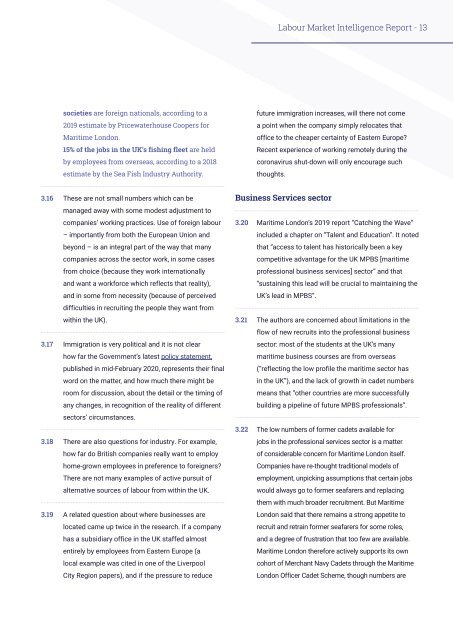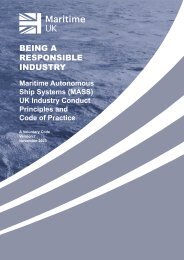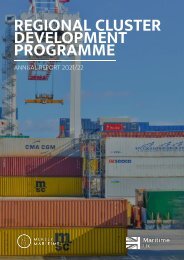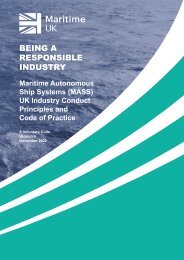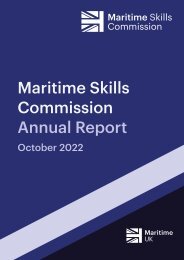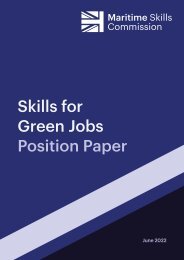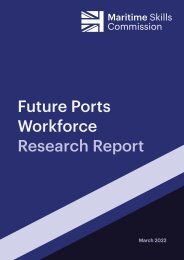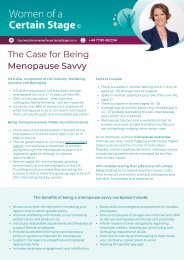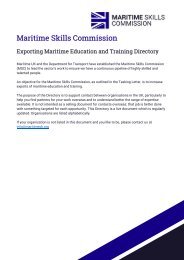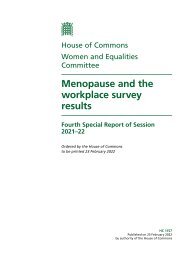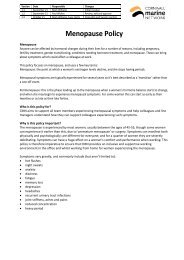Maritime Skills Commission - Labour Market Intelligence Scoping Report - August 2020
You also want an ePaper? Increase the reach of your titles
YUMPU automatically turns print PDFs into web optimized ePapers that Google loves.
<strong>Labour</strong> <strong>Market</strong> <strong>Intelligence</strong> <strong>Report</strong> - 13<br />
societies are foreign nationals, according to a<br />
2019 estimate by Pricewaterhouse Coopers for<br />
<strong>Maritime</strong> London.<br />
15% of the jobs in the UK’s fishing fleet are held<br />
by employees from overseas, according to a 2018<br />
estimate by the Sea Fish Industry Authority.<br />
future immigration increases, will there not come<br />
a point when the company simply relocates that<br />
office to the cheaper certainty of Eastern Europe?<br />
Recent experience of working remotely during the<br />
coronavirus shut-down will only encourage such<br />
thoughts.<br />
3.16<br />
3.17<br />
3.18<br />
3.19<br />
These are not small numbers which can be<br />
managed away with some modest adjustment to<br />
companies’ working practices. Use of foreign labour<br />
– importantly from both the European Union and<br />
beyond – is an integral part of the way that many<br />
companies across the sector work, in some cases<br />
from choice (because they work internationally<br />
and want a workforce which reflects that reality),<br />
and in some from necessity (because of perceived<br />
difficulties in recruiting the people they want from<br />
within the UK).<br />
Immigration is very political and it is not clear<br />
how far the Government’s latest policy statement,<br />
published in mid-February <strong>2020</strong>, represents their final<br />
word on the matter, and how much there might be<br />
room for discussion, about the detail or the timing of<br />
any changes, in recognition of the reality of different<br />
sectors’ circumstances.<br />
There are also questions for industry. For example,<br />
how far do British companies really want to employ<br />
home-grown employees in preference to foreigners?<br />
There are not many examples of active pursuit of<br />
alternative sources of labour from within the UK.<br />
A related question about where businesses are<br />
located came up twice in the research. If a company<br />
has a subsidiary office in the UK staffed almost<br />
entirely by employees from Eastern Europe (a<br />
local example was cited in one of the Liverpool<br />
City Region papers), and if the pressure to reduce<br />
Business Services sector<br />
3.20 <strong>Maritime</strong> London’s 2019 report “Catching the Wave”<br />
included a chapter on “Talent and Education”. It noted<br />
that “access to talent has historically been a key<br />
competitive advantage for the UK MPBS [maritime<br />
professional business services] sector” and that<br />
“sustaining this lead will be crucial to maintaining the<br />
UK’s lead in MPBS”.<br />
3.21 The authors are concerned about limitations in the<br />
flow of new recruits into the professional business<br />
sector: most of the students at the UK’s many<br />
maritime business courses are from overseas<br />
(“reflecting the low profile the maritime sector has<br />
in the UK”), and the lack of growth in cadet numbers<br />
means that “other countries are more successfully<br />
building a pipeline of future MPBS professionals”.<br />
3.22 The low numbers of former cadets available for<br />
jobs in the professional services sector is a matter<br />
of considerable concern for <strong>Maritime</strong> London itself.<br />
Companies have re-thought traditional models of<br />
employment, unpicking assumptions that certain jobs<br />
would always go to former seafarers and replacing<br />
them with much broader recruitment. But <strong>Maritime</strong><br />
London said that there remains a strong appetite to<br />
recruit and retrain former seafarers for some roles,<br />
and a degree of frustration that too few are available.<br />
<strong>Maritime</strong> London therefore actively supports its own<br />
cohort of Merchant Navy Cadets through the <strong>Maritime</strong><br />
London Officer Cadet Scheme, though numbers are


